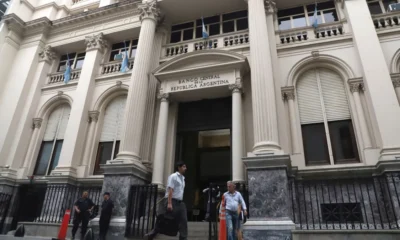INTERNACIONAL
Kenya's president backtracks on controversial tax increases after deadly protests shake nation

- Kenyan President William Ruto has announced that he will not sign a finance bill proposing new taxes following deadly protests across the nation.
- The bill aimed to raise funds for debt repayment but faced widespread opposition from Kenyans already grappling with economic hardship.
- Tuesday’s protests prompted military deployment, with Ruto labeling the actions as «treasonous.»
Kenyan President William Ruto said Wednesday he won’t sign into law a finance bill proposing new taxes, a day after protesters stormed parliament and several people were shot dead. It was the biggest assault on Kenya’s government in decades.
The government wanted to raise funds to pay off debt, but Kenyans said the bill caused more economic pain as millions struggle to get by. The chaos on Tuesday led the government to deploy the military, and Ruto called protesters’ actions «treasonous.»
The president now says the bill caused «widespread dissatisfaction» and he has listened and «conceded.» It’s a major setback for Ruto, who came to power vowing to help Kenyans cope with rising costs but has seen much of the country, led by youth, unite in opposition to his latest attempt at reforms.
KENYAN PROTESTERS VOW TO CONTINUE DEMONSTRATIONS AFTER VIOLENT CLASHES LEAVE 23 DEAD
«It is necessary for us to have a conversation as a nation on how to do we manage the affairs of the country together,» he said.
Edith Wanjiku, left, weeps after viewing the body of her son, who was allegedly shot by police during Tuesday’s protest at the Nairobi funeral home, Kenya on June 26, 2024. Kenyan President William Ruto said Wednesday he won’t sign into law a finance bill proposing new taxes, a day after protesters stormed parliament and several people were shot dead. (AP Photo/Brian Inganga)
Kenyans faced the lingering smell of tear gas and military in the streets a day after the latest protests saw thousands storm parliament, an act of defiance that Ruto had called an «existential» threat. At least 22 people were killed, a human rights group said, and police were accused of some shooting deaths.
Ruto acknowledged the deaths, calling it an «unfortunate situation,» and offered condolences. He said about 200 people had been wounded.
Nairobi has seen protests in the past, but activists and others warned the stakes were more dangerous. Ruto on Tuesday vowed to quash unrest «at whatever cost,» even as more protests were called at State House on Thursday.
«We are dealing with a new phenomenon and a group of people that is not predictable. If it would have been the normal demonstrations, I’d say it will fizzle out with time, but we don’t know whether these people will fear the army,» said Herman Manyora, an analyst and professor at the University of Nairobi.
5 CONFIRMED DEAD AFTER POLICE OPEN FIRE ON PROTESTERS ATTEMPTING TO STORM KENYA’S PARLIAMENT
He said the president missed an opportunity in his national address Tuesday night to adopt a more conciliatory approach.
Kenya’s High Court on Wednesday ordered the military deployment suspended after a challenge by the Kenya Law Society.
Kenyans united beyond tribal and other divisions in the effort to keep the finance bill from becoming law. It would have raised taxes and fees on a range of daily items and services, from egg imports to bank transfers.
There were no reports of violence Wednesday, but there was fear. Civil society groups have reported abductions of people involved in recent protests and expect more to come. The High Court ordered police to release all people arrested in the protests. Ruto said those allegedly abducted had been released or processed in court.
Many young people who helped vote Ruto into power in 2022 with cheers for his promises of economic relief now object to the pain of reforms. Part of the parliament building burned Tuesday, and clashes occurred in several communities beyond the capital.
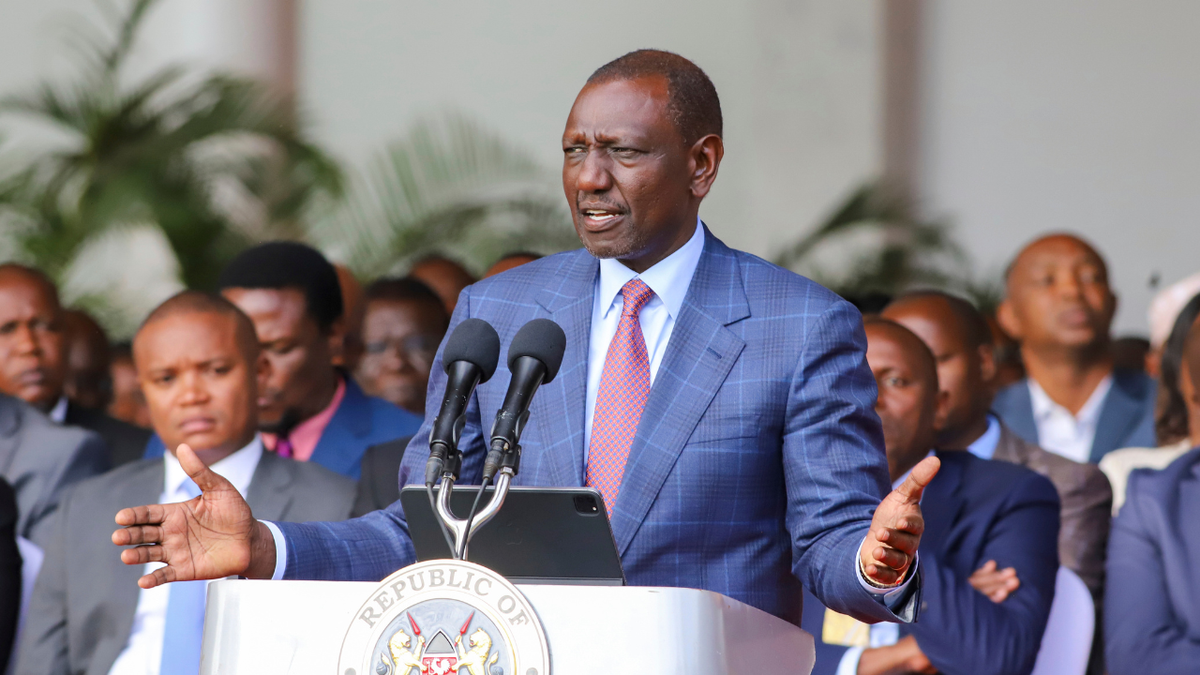
Kenyan President William Ruto gives an address at the State House in Nairobi, Kenya, on June 26, 2024. (AP Photo/Patrick Ngugi)
At least 22 people were killed, the Kenya National Human Rights Commission said. Commission chairperson Roseline Odede said 300 others were injured, and 50 people were arrested.
The mother of a teenager killed, Edith Wanjiku, told journalists at a morgue that the police who shot her son should be charged with murder because her 19-year-old son had been unarmed.
«He had just completed school and was peacefully protesting,» she said.
Parliament, city hall and the supreme court were cordoned off with tape reading «Crime Scene Do Not Enter.» Authorities said police fired over 700 blanks to disperse protesters in the Nairobi suburb of Githurai overnight.
«My plea to the president is to listen to us and understand that this financial bill they want to pass is not as important as people’s lives,» said one Nairobi businessman, Gideon Hamisi. «Many young people lost their lives yesterday. I am a young man, and I feel deeply pained by what transpired.»
Opposition leader Raila Odinga called for dialogue, asserting that Kenya’s constitution had been suspended. «Kenya cannot afford to kill its children just because the children are asking for food, jobs and a listening ear,» he said in a statement.
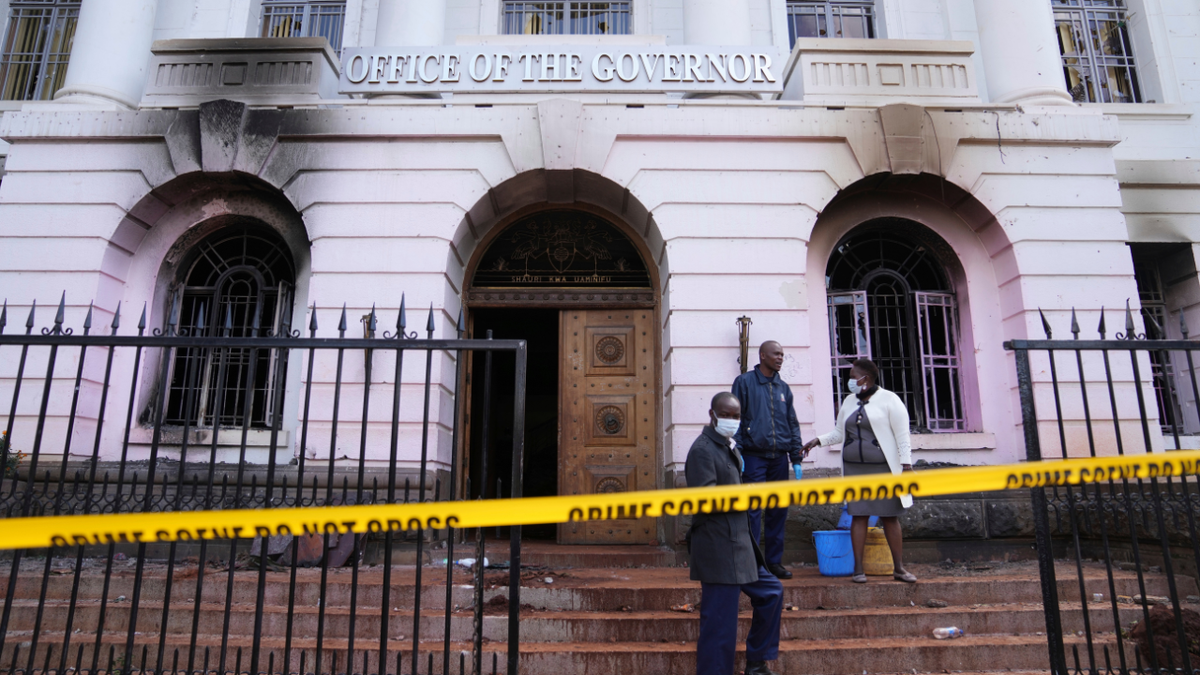
Nairobi county workers stand in front of the governor’s office, which was burned during yesterday’s protest over proposed tax hikes in a finance bill in downtown Nairobi, Kenya, on June 26, 2024. (AP Photo/Brian Inganga)
In Nairobi, a regional hub for expatriates and home to a United Nations complex, inequality among Kenyans has sharpened along with long-held frustrations over state corruption. The booming young population is also frustrated by the lavish lifestyles of politicians, including the president. Some who had passionately supported Ruto, who won power by portraying himself as a «hustler» of humble background, feel betrayed.
The youth, commonly referred to as Gen Zs, mobilized the protests and sought to keep lawmakers from approving the finance bill Tuesday. Ruto had two weeks to sign the bill into law.
The president’s concession was «self preservation» by a leader worried about his reputation, opposition Sen. Edwin Sifuna wrote on X.
The events are a sharp turn for Ruto, who has been embraced by the United States as a welcome partner in Africa while frustration grows elsewhere on the continent with the U.S. and some other Western powers.
CLICK HERE TO GET THE FOX NEWS APP
In May, Ruto went to Washington on the first state visit by an African leader in 16 years. On Tuesday, as the protests exploded, the U.S. designated Kenya as its first major non-NATO ally in sub-Saharan Africa, a largely symbolic act but one highlighting their security partnership. Also, on Tuesday, hundreds of Kenyan police deployed to lead a multinational force against gangs in Haiti, an initiative that brought thanks from U.S. President Joe Biden.
Now Kenya’s government, along with protesters, face pleas for calm from partners including the U.S., which joined a dozen other nations in a statement Tuesday expressing «deep concern» over the violence and abductions.
«How did we get here?» Kenya’s vice president, Rigathi Gachagua, asked Wednesday in nationally broadcast comments after the president’s turnabout, openly wondering how the government had become so unpopular in just two years. «We were the darling of the Kenyan people.»
INTERNACIONAL
As the Dalai Lama turns 89, exiled Tibetans fear a future without him

In a monastery beneath snow-capped mountains in northern India, the Buddhist monk entrusted with protecting the Dalai Lama and foretelling his people’s future is concerned.
The Dalai Lama turned 89 on Saturday, and China insists it will choose his successor as Tibet’s chief spiritual leader. That has the Medium of Tibet’s Chief State Oracle contemplating what might come next.
DALAI LAMA SAYS HE WAS BEING ‘INNOCENT AND PLAYFUL’ WHEN ASKING YOUNG BOY TO ‘SUCK MY TONGUE’
«His Holiness is the fourteenth Dalai Lama, then there will be a fifteenth, sixteenth, seventeenth,» the medium, known as the Nechung, said. «In countries, leaders change, and then that story is over. But in Tibet it works differently.»
Tibetan Buddhists believe that learned monastics are reincarnated after death as newborns. The Dalai Lama, who is currently recuperating in the United States from a medical procedure, has said he will clarify questions about succession — including if and where he will be reincarnated — around his ninetieth birthday. As part of a reincarnation identification process, the medium will enter a trance to consult the oracle.
The incumbent Dalai Lama is a charismatic figure who popularized Buddhism internationally and won a Nobel Peace Prize in 1989 for keeping alive the Tibetan cause in exile. Beijing sees him as a dangerous separatist, though he has embraced what he calls a «Middle Way» of peacefully seeking genuine autonomy and religious freedom within China.
The Dalai Lama turned 89 years old on Saturday. (AFP via Getty Images / File)
Any successor will be inexperienced and unknown on the global stage. That has sparked concerns about whether the movement will lose momentum or grow more radical amid heightened tensions between Beijing and Washington, long a source of bipartisan support for the Central Tibetan Administration, Tibet’s government-in-exile.
The CTA and its partners in the West as well as India, which has hosted the Dalai Lama in the Himalayan foothills for more than six decades, are preparing for a future without his influential presence.
President Joe Biden is expected to soon sign a bill that requires the State Department to counter what it calls Chinese «disinformation» that Tibet, which was annexed by the People’s Republic of China in 1951, has been part of China since ancient times.
«China wants recognition that Tibet has been part of China … throughout history, and this bill is suggesting that it would be relatively easy for Tibet supporters to get a western government to refuse to give recognition for such an extensive claim,» said Tibet specialist Robert Barnett of London’s School of Oriental and African Studies.
U.S. lawmakers, including former House speaker Nancy Pelosi, D-Calif., visited the Dalai Lama last month to celebrate Congress passing the legislation, which Sikyong Penpa Tsering, who heads the CTA, called a «breakthrough.»
The bill is part of a strategic shift away from emphasizing Chinese rights violations such as forced assimilation, the Sikyong, or political leader, told Reuters. Since 2021, CTA has lobbied two dozen countries, including the U.S., to publicly undermine Beijing’s narrative that Tibet has always been part of China, he said.
With U.S. weight behind this strategy, the exiles hope to push China to the negotiating table, he said. «If every country keeps saying that Tibet is part of the People’s Republic of China, then where is the reason for China to come and talk to us?»
The Chinese foreign ministry said in response to Reuters’ questions that it would be open to discussions with the Dalai Lama about his «personal future» if he «truly gives up his position of splitting the motherland» and recognised Tibet as an unalienable part of China.
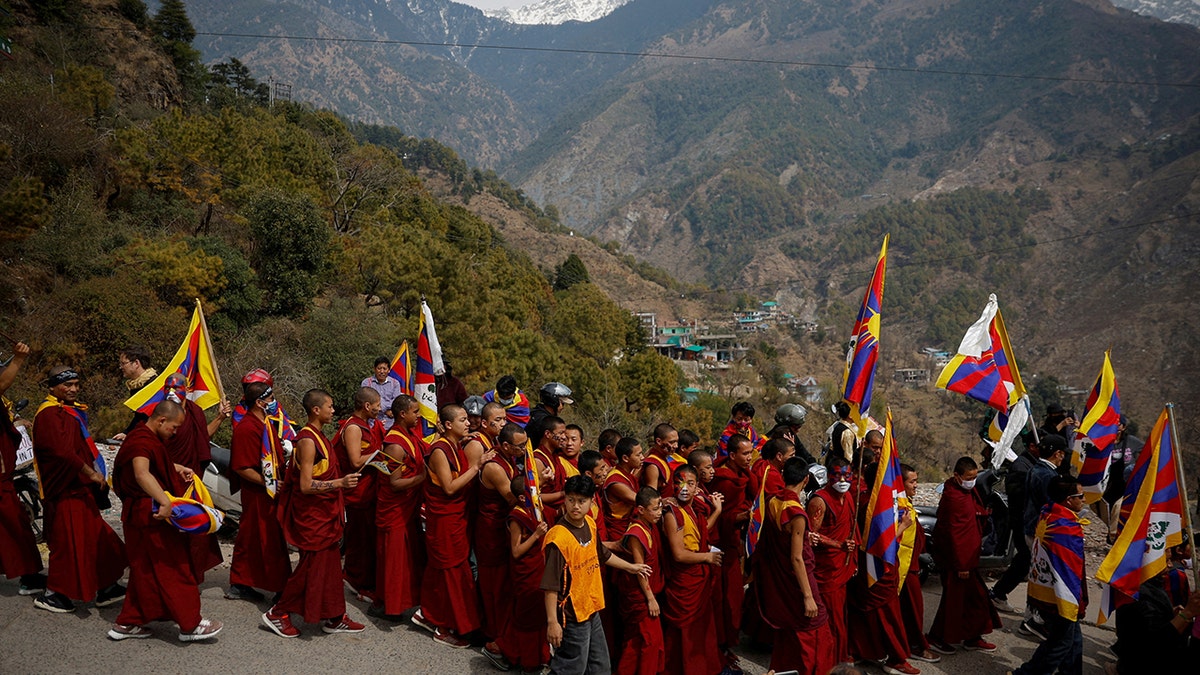
Tibetans participate in a protest march held to mark the 65th anniversary of the Tibetan uprising against Chinese rule, in the northern hill town of Dharamsala, India, March 10, 2024. (Reuters / Adnan Abidi / File)
Beijing, which has not held official talks with the Dalai Lama’s representatives since 2010, has also urged Biden not to sign the bill.
The office of the Dalai Lama, who has in recent years apologized for remarks he made about women and to a young child, referred an interview request to the Sikyong.
Succession questions
Most historians say Tibet was assimilated into the Mongol Empire during the 13th-14th century Yuan dynasty, which also covered large parts of present day China. Beijing says that it established its sovereign claim, though scholars believe the relationship varied greatly over the centuries and remote Tibet largely governed itself for much of the time.
The People’s Liberation Army marched into Tibet in 1950 and announced its «peaceful liberation». After a failed uprising against Chinese rule in 1959, a young Dalai Lama fled into exile in India.
In 1995, atheist China and the Dalai Lama separately identified two boys as the Panchen Lama, the second-most-important Tibetan Buddhist leader. The Dalai Lama’s pick was taken away by Chinese authorities and has not been seen since.
Many Buddhists consider Beijing’s choice illegitimate, though most expect a similar parallel selection for the next Dalai Lama given the Chinese government’s stance that he must reincarnate, and it must approve the successor.
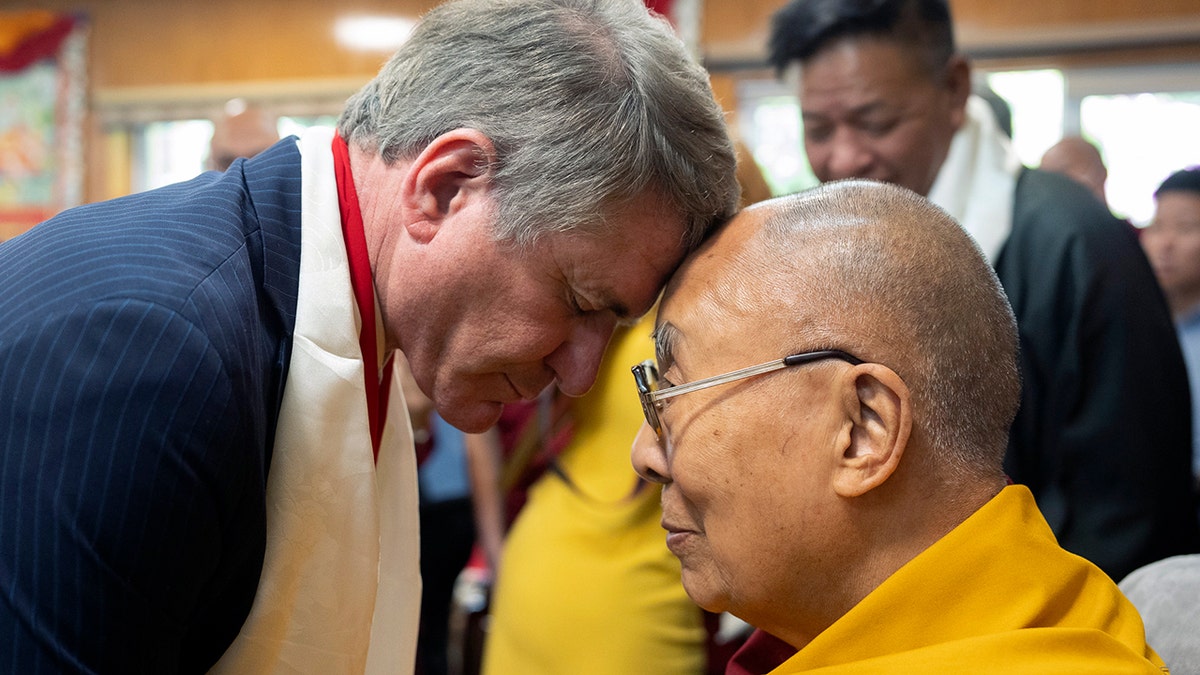
In this photo shared by the Office of the Dalai Lama, U.S. Rep. Michael McCaul, R-Texas, left, is greeted by Tibetan spiritual leader the Dalai Lama, at the Tibetan leader’s residence in Dharamshala, India, June 19, 2024. (Tenzin Choejor/Office of the Dalai Lama via AP)
Chinese authorities have «tried to insert themselves into the succession of the Dalai Lama, but we will not let that happen,» said U.S. Rep. Michael McCaul, R-Texas, Republican chairman of the House Foreign Affairs Committee during his Dharamsala visit last month.
India, whose troops clashed with China near the Tibetan plateau in 2022, has been less vocal about its position on succession.
«The U.S. … does not have to worry about border incursions as India does,» said Donald Camp, a former top South Asia official on the U.S. National Security Council.
But as home to tens of thousands of Tibetans and an ascendant voice on the global stage, Delhi will be pulled into the fray, observers of Indian diplomacy say. Hawkish commentators have already called on Prime Minister Narendra Modi to meet with the Dalai Lama as a way of pressuring China.
Delhi’s Ministry of External Affairs declined to comment on the succession but its former ambassador to China, Ashok Kantha, said India would not be «comfortable with China trying to control that process.»
«Privately, we have told China … that for them the best option is engaging with the Dalai Lama and his representatives,» said Kantha. «Post-fourteenth Dalai Lama we don’t know what will happen.»
The respect that the Dalai Lama commands among Tibetan exiles has kept in check frustrations and a formal push for independence, though it isn’t clear if that balance will be maintained following his death.
Tibetan Youth Congress general secretary Sonam Tsering said his advocacy group respected the Middle Way but, like many other young Tibetans, it wanted full independence.
For now, Tibetans are focused on supporting the Dalai Lama in fulfilling his desire to return to his homeland before his death, he said.
But if the wish «is not fulfilled, then the emotional outburst, the emotional challenges they are going through, it’s very difficult to think of,» he said.
The Sikyong said CTA’s new emphasis on challenging China’s narrative united pro-independence Tibetans with those pursuing the Middle Way, as Tibet’s historical status was a point of common agreement.
CLICK HERE TO GET THE FOX NEWS APP
On Saturday, tens of thousands of Buddhists and well-wishers around the world will gather to celebrate and pray for the long life of a leader who for them represents the strongest hope of an eventual return to Tibet.
But time for both the Dalai Lama and his people is starting to run out.
-
POLITICA3 días ago
Tras romper con Macri, Patricia Bullrich negó su salida del PRO: “Ni loca me voy, nos quedamos”
-
POLITICA21 horas ago
Detuvieron a un hombre armado a metros del acto de Milei en San Juan
-
ECONOMIA2 días ago
La inflación de junio rondaría el 5,2% según los analistas consultados por el Banco Central
-
SOCIEDAD3 días ago
Caso Loan: Camila declaró por más de cinco horas y al salir pidió que encuentren al nene
-
POLITICA2 días ago
El Gobierno busca bajar la tensión con el PRO y dice que cumplirá el fallo por la coparticipación a la Ciudad que reclamó Macri
-
POLITICA2 días ago
Federico Sturzenegger es el nuevo ministro de Desregulación y Transformación del Estado






















